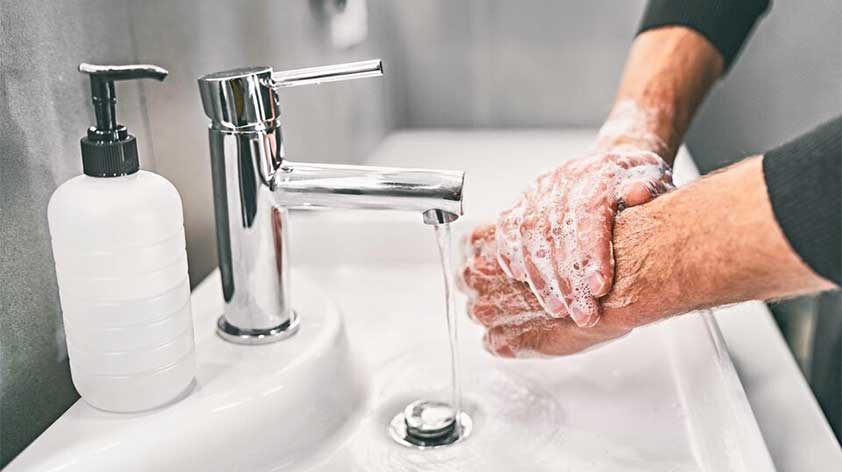
The consequences of the COVID-19 pandemic have affected the world beyond imagination. It has infected millions of people in almost every country on Earth, unlike any other global pandemic the world has ever faced before.
Everyone has been taught since childhood to wash their hands and maintain personal hygiene, especially at certain times like when cooking or using the bathroom. Yet people are often too caught up in their busy lives to follow most of these basic-yet-important hygiene measures. However, the pandemic has emphasized the importance of these forgotten hygiene practices. Read on for The 7 Hygiene Lessons We Learnt during the COVID-19 Pandemic!
1. Learn to Lead a Touch-Less Life
You can get infected through personal contact with others. The hands-off lifestyle is another practice that emerged during 2020. We’ve learned to avoid handshakes and to replace formal greetings with other gestures. Also to diminish the risk of infection through physical contact, there are medication delivery apps that deliver medicines directly to your door; all you have to do is to upload the prescription.
Most countries have installed contactless facilities in public spaces, including automated doors, sensor-equipped taps, lights, and air conditioners. Practices like keeping the doors open and face scanners instead of biometric systems are also becoming widespread.
2. Sanitize Frequently
Sanitizing surfaces was not considered necessary by most people before the outbreak of the COVID-19 pandemic. As long as a surface looked clean, we largely assumed it was safe. However, such assumptions are not valid anymore. We’re now aware that the surfaces we interact with may harbour all kinds of invisible, harmful microbes, including the coronavirus.
The pandemic has inspired an extra level of caution among individuals and organizations and we now regularly sanitize public spaces, seats on public vehicles, and any exposed surface. Companies have consulted hygiene experts like phsinterclean.co.uk for professional assistance in cleaning and sanitizing their sites and work places.
3. Avoid Touching Your Face
Touching or rubbing your face is an involuntary action that we all do, almost unconsciously, dozens of times every day. We are so accustomed to rubbing and scratching our eyes or nose that we are not even conscious that we’re doing it. However, the ‘new normal’ has made everyone consciously avoid this habit, especially when you are in public spaces or vehicles.
4. Sneeze or Cough into your Elbow
With COVID, people learnt many new things and started paying more attention to campaigns and instructions from health organizations like the WHO. Now we know it is a terrible idea to sneeze or cough directly into our hands. It’s far better to cover your mouth and nose with your elbow while sneezing or coughing. You can also use a tissue, but always discard the used tissue appropriately, as per hygienic disposal guidelines.
5. Face-Masks & Social Distancing are not Optional
This viral disease spreads through respiratory droplets. According to research, the droplets released by an infected person can travel up to around six feet in the air. Thus, any healthy individual in the proximity of a sick person can be infected, as there is a high risk of inhaling respiratory droplets.
This is why we should keep a distance of at least six feet between individuals in public spaces. Also, wearing masks has become mandatory since it can reduce the release of respiratory droplets. It also prevents any accidental inhalation of such droplets.
6. Keep Your Hands Clean
Any surface might have an accumulation of such respiratory droplets, and this is the second-most common way that the virus is spread. Door knobs, handles, railings, and counters in public buildings and vehicles are at maximum risk of contamination and accumulation of infectious particles.
Touching such surfaces can be a huge problem as we can then touch our face and from there get infected. Hence, hand hygiene measures like washing your hands frequently with soap and water or sanitizing them with alcohol-based sanitizers, plays a crucial role in preventing the spread of infection. Remember to wash your hands thoroughly for about 20 to 30 seconds.
7. Personal Hygiene
Personal hygiene and cleanliness are virtues essential for a healthy life. Yet, lack of awareness, time, and resources can cause people to often overlook them. However, following the outbreak of the COVID-19 pandemic, personal hygiene has emerged as the primary precaution against the disease. Since the beginning of the pandemic, it has become one of the main ways to help fight the spread of the virus.
Hygienic practices at a personal level have become inevitable to ensure individual safety, as well as that of the wider community. Practices such as regular hand washing and respiratory hygiene have become part of our strict daily routine. Even if you’ve increased your attention to personal hygiene, it’s still possible to contract COVID-19. If you have recently been in contact with someone who has COVID-19 or is feeling flu-like symptoms, it’s important to get tested to help prevent the spread of the virus. If you’re curious if you’ve already had an infection, whether or not you had symptoms, you can get a COVID antibody test in Atlanta with an in-home medical service such as Drip Hydration.
The COVID-19 outbreak has caused massive disruptions to our lives, from the ability to engage in our daily tasks, to our work and social lives. Under such trying circumstances, maintaining good hygiene is the only effective way to protect ourselves and others from the disease. Though vaccination programmes have started in many countries, remembering the hygiene lessons from the COVID-19 outbreak is still the best fall-back way to stay healthy in the long term.









